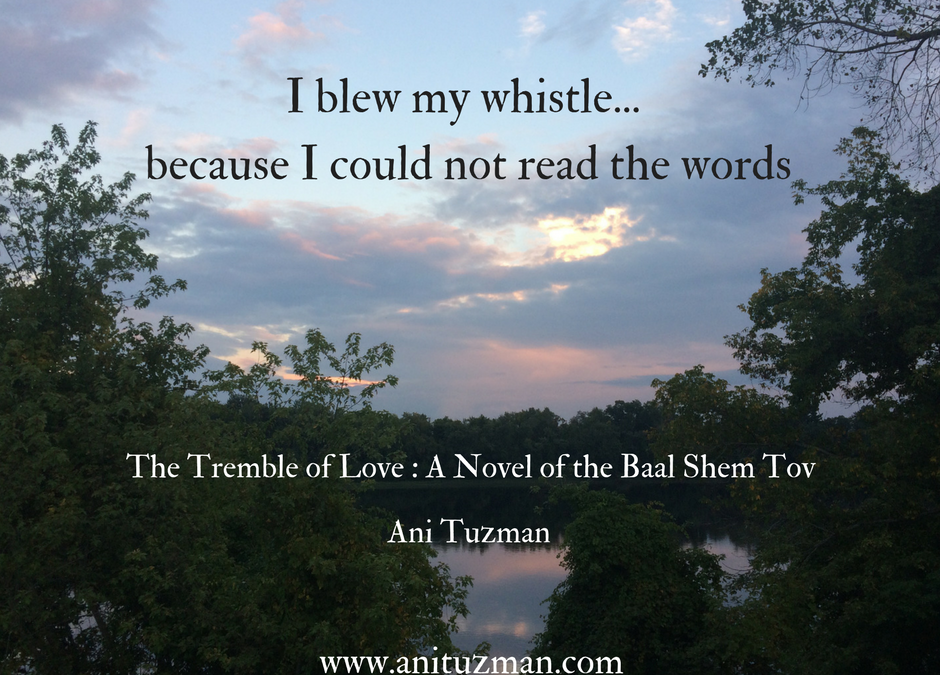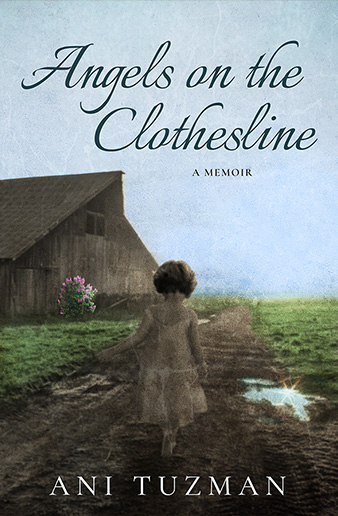There are some aspects of living and loving that are timeless. One of these is prayer. On the holiest day of the year, an illiterate shepherd boy prays with his whistle and pure heart. Only then can the Shofar sound.
No matter your faith, join me now on the holy day of Yom Kippur in 1736.
In a moment, we will find ourselves in a shul, a synagogue—one of the grandest of its time in the Polish-Lithuanian Commonwealth in the 1700s.
In this scene from The Tremble of Love: A Novel of the Baal Shem Tov, we will be seeing the synagogue and its congregants through the eyes of Dalia, the daughter of the controversial Yisroel ben Eliezar. Yisroel has been invited by his esteemed brother-in-law Gershon to lead the closing service of the High Holiday of Yom Kippur.
Dalia, twelve now, has grown up in a remote mountain village. She has prayed with her father and her mother in fields, on a riverbank, but has never before been in a formal house of prayer.
So now, let’s join Dalia and the others gathered in the Brody Shul on Yom Kippur, 1736.
LISTEN TO ANI READ THE SCENE
The following passage can be found on pages 322-324 in The Tremble of Love: A Novel of the Baal Shem Tov.
Dalia wished she was close enough to get a good look at the golden brocaded letters on the Torah’s mantle and at the delicately filigreed vines that formed Her crowns. She hoped she would at least be able to hear the tiny bells, which she’d learned were often attached to the tops of the crowns and rang delicately when the Torah was carried among the congregants. Even though the Torah would not be carried among the women, maybe she would still hear the bells.
Some hours later in the service, Dalia watched her father climb slowly up the steps of the bimah in the center of the huge synagogue filled with Brody’s Jews. Every seat was taken. Men stood in the aisles and at the back of the room; their wives and daughters filled the balcony. If her father had known the size and grandeur of this synagogue, would he still have agreed to lead all these people in prayer? He had only conducted prayers with a handful of people, at most.
Dalia looked down at the platform upon which her father now stood, his large prayer shawl wrapped around him and draped over his head as he swayed from side to side. She heard the mounting fervor in his prayer. The entreaty in his voice stirred Dalia to tears.
When it grew long past sunset and the hour the service should have concluded, Dalia wondered if her uncle Gershon might be regretting his decision. Was it not well past the time for all to go home and break the fast with as much or as little as one had to eat? The sun had set nearly an hour earlier on the solemn fast day that had started at sundown the night before. Everyone, except for the old, the very young, and the sick had been standing for the past several hours, since the Ark had been opened. But still her father had not finished praying. The Shofar blast signifying the end of the holy day had not yet been sounded and the weary people had not yet been dismissed.
Dalia observed the congregants’ increasing impatience, their restless movements and glances, their sighs as they gazed at their timepieces. Some had begun to mumble discontentedly. At least, the mumbling made it less likely anyone would hear the growling in Dalia’s stomach. It was only her second full fast since she had crossed the threshold from girlhood.
Dalia knew that nothing her father did was unintentional. Surely he could feel the growing tension in the synagogue. But his head remained bowed. His impassioned and direct communication with the Ayn Sof had become more subdued.
Suddenly, a piercing whistle sounded. Dalia looked around, as did others, to find its source. A poorly dressed boy blew a second time on a small shepherd’s pipe. Dalia saw the old man next to him, perhaps his grandfather, try unsuccessfully to capture the whistle.
She had noticed the boy earlier. He had been reluctantly approaching the House of Prayer led by the old and tattered man; both were wearing sheepskin vests. Curious about the two, Dalia had searched from the balcony to find them. The old man held no prayer book; perhaps he could not read. Dalia had thought it curious to see him stay the child’s small hand with his heavy one whenever the boy reached into his pocket. The boy must have been seeking his whistle. Now, the weary shepherd tried unsuccessfully to wrest the small pipe from the boy. But in another swift, undeterred move, the boy blew into it with all the power he could summon.
Her father had straightened, pulled his prayer shawl back from his head, and turned to look at the boy. Refusing to yield the pipe, he sounded it again for the third time before restoring it to his pocket.
The silence that fell over the congregation amazed Dalia, given the restlessness just a moment earlier. When the boy noticed Yisroel looking at him, he bowed his head and muttered something. Was it an apology? Dalia strained to hear him. Her abba asked the boy to speak so all could hear.
“I blew my whistle to tell Adonai how much I love Him, because I cannot read the words.”
Yisroel nodded, smiling broadly. He then proceeded to recite the last words of the closing prayer, lifted the Shofar, and sounded the final penetrating blast signaling the end of the holy day. Although all were hungry and had been so eager to leave, no one moved from his or her place. Transfixed, Dalia watched her father’s compassionate glance sweep through the House of Prayer.
“We pray each day,” Yisroel’s voice boomed. “And you shall love the Lord your God, with all your heart, with all your soul, and with all your might. Just now, a pure sound issued with heart, soul, and all the might of this child has lifted the rest of our prayers. The young shepherd held nothing back, wanting only to give his love. We can learn from him how to pray. When we offer our loving gratitude without holding back—just as we are—our prayers become irresistible.”
I would LOVE to hear your reflections in response to this scene, and to hear about your relationship to and experience(s) of prayer. The older I get, the more I appreciate the countless ways there are to pray with and without words.
It would be an honor to hear about your experiences of prayer and/or about “holiness.” Please consider sharing below.* Thank you!
*I review all messages before they are posted publicly (screening for spam). if you prefer that your comment be posted anonymously, just note that at the end of your comment.
G'Mar Chatima Tova
I close with this customary greeting whose literal meaning is: "a good final sealing." I will add to that: May you know the love of which you are made. What better than to know this?
With gratitude,
Ani
Your comments make this blog a conversation!
I would love to hear from you.
To avoid spam all comments are moderated by Ani. So if you don’t see your comment show up, not to worry; your comment will be up within within 24-48 hours






Dear Ani,
I so much enjoyed reading your excerpt on The Whistle and Prayer. In many Medieval stories a juggler or an acrobat performs in front of the altar in an empty church, because that is the only gift he or she has to offer, and God accepts the offering. There are so many ways of praying. Besides Communal prayer and formal prayer, I find myself giving thanks to God whenever I see a beautiful cloud formation, or am saved from skidding on an icy road, or reach home again after a long journey. And offering up a cry for help when one of my friends is ill and I hear of it.
Have a wonderful New Year, Ani, and all your family. too.
Janet
Janet, thank you for taking the time to read this post and for your comment. I so appreciate your reflections of many forms of prayer: how delightful, the image of the jugglers and acrobats praying in their own manners in front of massive, ornate Medieval churches—and the contrast of that prayer with your quiet prayers of gratitude. And then there is the spontaneous prayer that even those who say they do not pray, pray: the rising up of a cry for help.
I have felt drawn to read more about prayer and the kinds of prayer. Your comment fuels that desire.
Also, a big thank you for your kind wishes for me and family! I wish the same to you.
In this year to come and beyond, may families everywhere find the shelter needed, physical and otherwise, in the embrace of genuine love and respect.
Ani